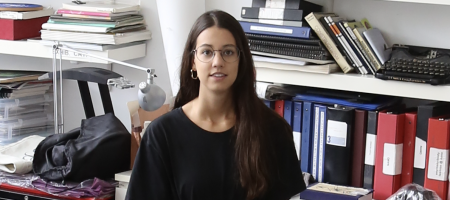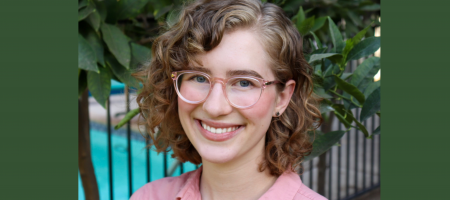Student Spotlight – Ivana Dama
Meet fourth-year undergraduate researcher Ivana Dama!
Ivana majors in Design Media Arts with a minor in Digital Humanities and is in our Undergraduate Research Scholarship Program. The title of her research project is “Music Map.”
How did you first get interested in your research project?
Before coming to UCLA, I never thought that the School of Arts and Architecture would be a great place for research. I believed that only scientists did research projects. I soon realized that most of professors were conducting research in the art field, and I got inspired to change my art practice approach. My work became an ongoing experiment in which I wasn’t only focused on the final project; the process became an important aspect of my work. During my second year, I became a member of the Art|Sci Center at UCLA, where I was able to work closely with scientists on research-based art projects.
What has been the most exciting aspect of your research so far?
My project is called a Music Map, and my goal is to explore untraditional ways to play an instrument. The users will be able to create a musical composition by changing their geographic location. The most exciting part of my project is testing the application and applying that knowledge to my research paper. Another exciting moment was in the initial stage of the process, when I searched for similar projects and experiments done in the past. It is fascinating to realize how many similar technologies were used for different purposes.
What has surprised you about your research or the research process?
The biggest surprise in my research project was a public interest in my work. Many people offered to test my application, and I was really grateful for that. When we are so focused on our projects, it is essential to hear different opinions and fresh perspectives on the same subject. As I’m moving forward with my research, I’m surprised each day with the Undergraduate Research Center’s generous support.
What is one piece of advice you have for other UCLA students thinking about doing research?
My biggest advice for all UCLA students interested in research is not to be afraid to ask for help or advice. Even though most of our professors and mentors seem busy, they are almost always interested in hearing new research ideas and projects in their fields. I was positively surprised by the incredible feedback I got from many of my previous professors.
What effect do you hope your research has in your field, at UCLA, in your community, or in the world?
My goal is to create an open-source application that will enable anyone to generate a musical composition. For centuries, only skilled people could play an instrument, and I’m hoping to change that. This application will allow UCLA to have a site-specific interactive map application with dynamic audio sources, users as audio sources, pervasive/ubiquitous games, and social networks.



